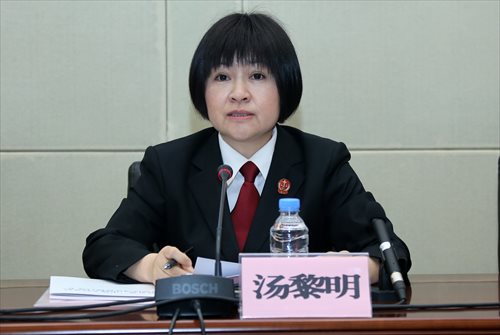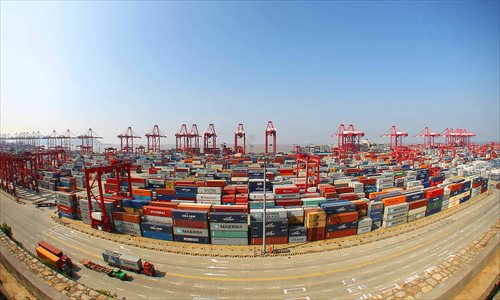HOME >> METRO SHANGHAI
Justice system reviews new practices at Shanghai’s FTZ
By Liao Fangzhou Source:Global Times Published: 2016-5-5 17:28:01
A pool of jurors drawn from the financial sector and a corporate mediation system have been highlights in the last two years of handling legal disputes at Shanghai's Pilot Free Trade Zone, the court tasked with handling the cases noted at a press conference last week.
Through the end of March, the Shanghai No.1 Intermediate People's Court handled 765 cases at the China (Shanghai) Pilot Free Trade Zone (FTZ). The cases cover criminal, civil and corporate laws, and intellectual property rights, the court said. Tang Liming, the deputy head of the court, said that more than 75 percent of the cases involved contractual disputes. The bulk of those cases - nearly half - concerned sales (18.6 percent), real estate (18.3 percent) and labor (10.8 percent).
Financial experts as juries
Since April 2015, nine financial professionals have served as expert jurors whose rulings are binding. Drawn from the city's regulatory commissions for banking, securities and insurance, as well as universities and research institutes, the expert jurors adjudicate cases that the court finds "highly professional in terms of finance."
Each juror was appointed by the Pudong New Area's People's Congress on a five-year term, and has so far participated in at least one case. Their job is to make sure that the facts are clear, the law is appropriately applied and the policy is understood.
One juror, Song Xiaoyan, a law professor with the Shanghai University of Finance and Economics, praised the court for its specialized handling of FTZ cases. After all, she said, it is a procedure that the court volunteered to undertake.
Tang agreed, noting that the court is not among the 50 pilot courts nationwide for a jury system.
Shan Suhua, who is the head of the 6th Civil Court with the court, said the jurors are not only experienced in law, but in finance and business, especially conflicts that rise from structural upgrades of financial products.
"We will expand the number of jurors if we need to. It's very possible," Shan said.
A new resolution
The court also introduced a mediation system that it calls Alternative Dispute Resolution (ADR), involving the Shanghai Commercial Mediation Center.
Through April 26, the mediators saw nearly 30 corporate and IP cases being mediated, and six of them reached settlements. The settlements in this regard totaled 1.2 billion yuan. Tang said there are a few characteristics of Chinese business people that make ADR, which can be introduced before a legal case is filed as well as during the litigation, particularly desirable for them.
"First, they are more sensitive to the length and cost of litigation. Secondly, they value confidentiality more, while nowadays the great extent of legal transparency means that a lot of their paperwork can be directly found online. This is something even the plaintiffs do not like to see. Third, they believe in the long-held Chinese idea that 'harmony brings wealth', so they wish to avoid cases if they could, and put it away as quickly as possible," Tang said.
If mediation doesn't reach a conclusion within 20 working days, the case goes back to the court.
Business, not charity
Tang noted that while the cost of civil mediation has dropped because of government funding for taking the option, fees for corporate mediation are paid by involved parties. However, if mediation fails, no payment is required.
However, she believes all mediation ought to charge a "reasonable amount of money" in the first place, for a healthier development of ADR."Corporate ADR is not dealing with minority groups; it is not charity. I hope the jurisdiction can pay attention to this," Tang said.
At the conference, the court also noted infrastructure aimed at streamlining the handling of case loads.
The court noted that 59.3 percent of the parties both register and practice their businesses within the FTZ, while 39.1 percent only register there but conduct business elsewhere. About 7.5 percent involve parties in Hong Kong, Macau, Taiwan and overseas.
Because of this, the court employs a digitized system for case filing. It was noted that it takes three minutes for the court to generate and submit litigation paperwork and for the clients to get documents back by mobile phone.
By the end of March, the court said, it had delivered more than 3,400 pieces of paperwork of nearly 700 cases through the system.





Newspaper headline: Courts for cargo
Through the end of March, the Shanghai No.1 Intermediate People's Court handled 765 cases at the China (Shanghai) Pilot Free Trade Zone (FTZ). The cases cover criminal, civil and corporate laws, and intellectual property rights, the court said. Tang Liming, the deputy head of the court, said that more than 75 percent of the cases involved contractual disputes. The bulk of those cases - nearly half - concerned sales (18.6 percent), real estate (18.3 percent) and labor (10.8 percent).
Financial experts as juries
Since April 2015, nine financial professionals have served as expert jurors whose rulings are binding. Drawn from the city's regulatory commissions for banking, securities and insurance, as well as universities and research institutes, the expert jurors adjudicate cases that the court finds "highly professional in terms of finance."
Each juror was appointed by the Pudong New Area's People's Congress on a five-year term, and has so far participated in at least one case. Their job is to make sure that the facts are clear, the law is appropriately applied and the policy is understood.
One juror, Song Xiaoyan, a law professor with the Shanghai University of Finance and Economics, praised the court for its specialized handling of FTZ cases. After all, she said, it is a procedure that the court volunteered to undertake.
Tang agreed, noting that the court is not among the 50 pilot courts nationwide for a jury system.
Shan Suhua, who is the head of the 6th Civil Court with the court, said the jurors are not only experienced in law, but in finance and business, especially conflicts that rise from structural upgrades of financial products.
"We will expand the number of jurors if we need to. It's very possible," Shan said.
A new resolution
The court also introduced a mediation system that it calls Alternative Dispute Resolution (ADR), involving the Shanghai Commercial Mediation Center.
Through April 26, the mediators saw nearly 30 corporate and IP cases being mediated, and six of them reached settlements. The settlements in this regard totaled 1.2 billion yuan. Tang said there are a few characteristics of Chinese business people that make ADR, which can be introduced before a legal case is filed as well as during the litigation, particularly desirable for them.
"First, they are more sensitive to the length and cost of litigation. Secondly, they value confidentiality more, while nowadays the great extent of legal transparency means that a lot of their paperwork can be directly found online. This is something even the plaintiffs do not like to see. Third, they believe in the long-held Chinese idea that 'harmony brings wealth', so they wish to avoid cases if they could, and put it away as quickly as possible," Tang said.
If mediation doesn't reach a conclusion within 20 working days, the case goes back to the court.
Business, not charity
Tang noted that while the cost of civil mediation has dropped because of government funding for taking the option, fees for corporate mediation are paid by involved parties. However, if mediation fails, no payment is required.
However, she believes all mediation ought to charge a "reasonable amount of money" in the first place, for a healthier development of ADR."Corporate ADR is not dealing with minority groups; it is not charity. I hope the jurisdiction can pay attention to this," Tang said.
At the conference, the court also noted infrastructure aimed at streamlining the handling of case loads.
The court noted that 59.3 percent of the parties both register and practice their businesses within the FTZ, while 39.1 percent only register there but conduct business elsewhere. About 7.5 percent involve parties in Hong Kong, Macau, Taiwan and overseas.
Because of this, the court employs a digitized system for case filing. It was noted that it takes three minutes for the court to generate and submit litigation paperwork and for the clients to get documents back by mobile phone.
By the end of March, the court said, it had delivered more than 3,400 pieces of paperwork of nearly 700 cases through the system.



(From top) Song Xiaoyan, Tang Liming, and Shan Suhua attend the press conference.

An expert juror particiaptes in an FTZ case.
Photos: Courtesy of Chen Yongliang

Cargos have arrived at the Yangshan Deep Water Port in the FTZ. Photo: CFP
Newspaper headline: Courts for cargo
Posted in: Metro Shanghai